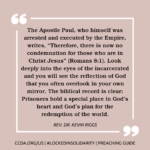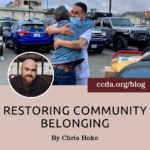For the last several years, Healing Communities PA partnered with the Metropolitan Christian Council of Philadelphia on the Restorative Cities Initiative™️, a grassroots “porch front to city hall” model of bringing restorative practices to every part of community life, particularly in BIPOC communities.
We began working with the Philadelphia District Attorney’s Office (DAO) in 2020, utilizing community and business leaders trained in restorative justice to facilitate circles with hundreds of the people arrested during the summer protests and unrest following the deaths of George Floyd and Breonna Taylor, nationally and Walter Wallace, locally here in Philadelphia. These efforts were met with some amazing results.
The Success of Restorative Justice
According to DAO, only 19% of those we worked with had any further contact with the criminal legal system, and none of those arrested during those protests were arrested during the 2023 protests related to the shooting death of Eddie Irizarry by the Philadelphia Police Department.
As a result of this success, with buy-in from sitting Philadelphia Municipal Court Judge Karen Simmons, we expanded the pilot to include BIPOC adults, most of whom were represented by public defenders, from communities most directly impacted by crime and mass incarceration, charged with felonies such as aggravated assault, grand theft auto, and robbery. We wanted felony cases because there was already a wide range of diversionary programs open to misdemeanor cases. We also wanted to make sure restorative justice wasn’t seen as another well-meaning “hippy dippy” diversion program only accessible to well-to-do white kids with private attorneys.
Our approach involves the community and wraps resources around both those who have caused harm and those who have been harmed to ensure that harm is addressed and needs are met, preventing further incidents. After completion, the charges are expunged from the participant’s record. This approach has led to fewer young BIPOC people living with the consequences of a felony conviction while introducing them to a community that cares enough to meet their needs and hold them accountable.
Those who have been harmed reported feeling more heard, whole, and involved in the process of accountability than going through traditional prosecution. They reported feeling empowered and having more ownership of the restorative justice process than simply going to court and testifying. They also reported feeling safer and experiencing less intimidation and traumatization than being cross-examined by a defense attorney.
The Realities of Restorative Justice
It’s significantly cheaper to resolve an incident with restorative justice than traditional prosecution by more than 75%. It sounds like a win-win for everybody, and in many cases, it is. Sometimes, however, it’s messier and less clear about who was harmed and why and what it will take to resolve it.
Three such cases come to mind. The first one is a young man arrested for grand theft auto because the “victim” willingly rented the young man his car for a specified period of time and then reported the car stolen when the young man didn’t bring it back early.
The second was a case where a young woman was arrested for home invasion, robbery, and aggravated assault, because of a fight with her best friend and roommate over a guy. The best friend’s father pushed for the charges and then put his daughter, grandson, the best friend, and her son on the street because his daughter wasn’t trying to ruin her best friend’s life. We had two sides of the same incident and two toddlers sleeping in a car together.
The third case was a young man in a fight with his girlfriend’s father, who was intoxicated, aggressive, and a much larger man, and was charged with aggravated assault. The father did everything he could to delay the process. He threatened to derail it over personality conflicts with the restorative justice facilitator, then would come back and say, “I don’t want to mess up his whole life.” After the case was withdrawn, he threatened to refile charges because the court forgot to give him a copy of the apology letter the young man read in the circle and in court at withdrawal.
I love restorative justice. It works, but sometimes, it takes a lot of prayer to navigate our messiness and bring the truth that sets us free.

About Rev. Dr. Chris Kimmenez
Rev. Dr. Chris Kimmenez is a national Baptist Minister and retired pastor, a formerly incarcerated USMC combat veteran in long-term recovery from substance use disorder and PTSS. He returned from prison in 1994, entered recovery in 1995, and ministry in 1996. After retiring from pastoring three churches in 2021, he currently serves as Associate Pastor of Social Justice at The People’s Baptist Church in Philadelphia, PA, as Executive Director of Healing Communities PA, an interfaith justice transformation initiative, and as Advocacy Chair of the Philadelphia Reentry Coalition. He holds a B.S. in Human Resources, an M.S. in Health Education, and a PsyD and is pursuing a DMin.






